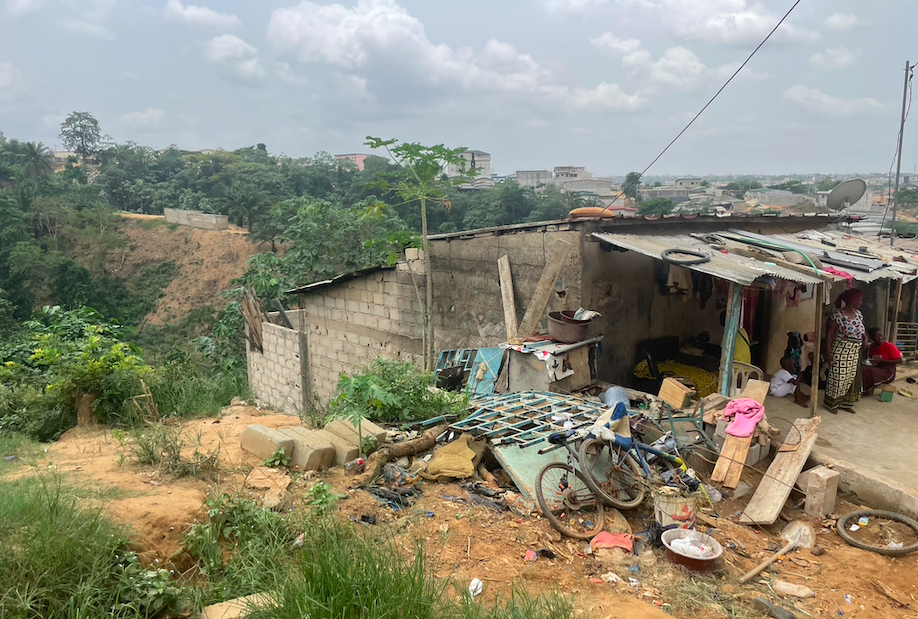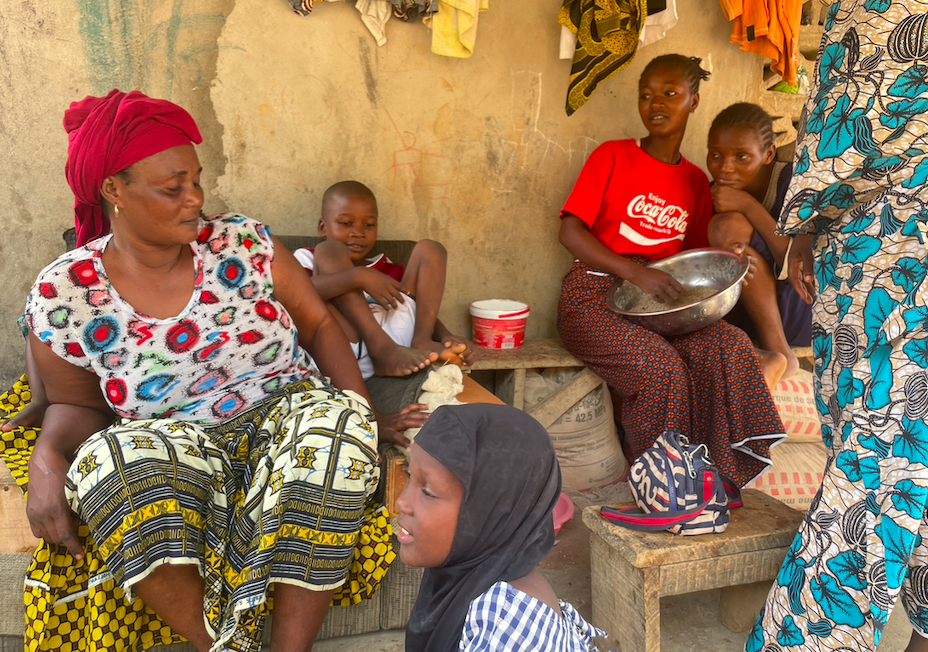Mariam’s daughter Zineb disappeared in 2022 in the Mediterranean Sea while trying to reach Europe. Like Zineb, many young people in Ivory Coast attempt to leave home without informing their loved ones. Their family’s guilt can be immense when they sometimes disappear.
When Mariam learned in 2022 of her daughter's disappearance in the Mediterranean Sea, she was pregnant with her eighth child. "Three months pregnant," she said, pausing. The pain was such that she began bleeding and had to be rushed to the hospital. The baby, named Sally, was saved. "But not my eldest... She's gone," Mariam said, clearly devastated.
Mariam doesn’t know exactly when Zineb died. She was 20 years old, and she had boarded a small boat bound for Europe from a Libyan beach. She was supposed to have arrived in Italy, before traveling to France. "She wanted to be a midwife," said Aminata, her 17-year-old sister, seated next to her mother and vigorously stirring millet in the scorching morning heat. "She wanted to succeed and send us money."
Mariam learned of her daughter's departure, who was working as a maid at the time, from one of her employers. The person called to complain about Zineb’s absence. When Mariam finally managed to reach her daughter on the phone several days later, Zineb was no longer in Ivory Coast but in Tunisia. "She hadn't told anyone." Zineb left discreetly with a cousin, who came to pick her up from Daloa, a city near the center of Ivory Coast. They had secretly conceived their project together. Like so many young people before them, they wanted to reach Europe, and France in particular.
The two young women later crossed into Libya, before being separated by smugglers. They set sail, but in different boats. Only the cousin finally made it to Italy.
Read AlsoLibya: UN confirms 93 bodies exhumed from mass graves

Regular calls, then silence
Since arriving in Tunisia, Zineb spoke to her mother regularly over the phone. But one Thursday, Mariam immediately sensed something was wrong. "She always picked up when I called her. That day, nothing. No answer. So I ended up calling her smuggler. He told me, 'There was a problem at sea... And she stayed there.'"
Sitting on her worn-out sofa, Mariam suddenly falls silent. The mention of the sea renders her speechless. Her family, gathered around her, as if to support her as she slowly continues to tell her story.
Mariam eventually learned that during the shipwreck, somewhere in the middle of the sea, Zineb had clung to the arm of a Nigerian. But exhausted, she finally let go. On the boat that had about twenty people, only nine survived, including the Nigerian. Mariam managed to begin speaking again: "Not having the body is very hard."
Read AlsoLibya: Almost 30 migrant bodies retrieved in one day
'I told him she was traveling'
At her feet, little Ahmed, watches uncomprehendingly. He does not speak French but Malinké. He is Zineb's son who is now six years old. His mother dropped him off at Mariam's house the morning she left. "She was supposed to pick him up in the evening as usual after her day at work," said Mariam.
Ahmed does not know the truth. To protect him, the family hid his mother’s death from him. "I told him she was traveling," said Mariam, justifying herself. Ahmed, she claimed, never talks about his mother, nor asks questions. "He is my son now, my youngest," she said with a tender look. "You are mine." The ninth sibling.

Two years later, the guilt is gnawing away at Mariam. Leaving for Europe is one thing, but why do it in secret? According to Ivorian associations, those wanting to leave have no other choice. "Many young people want to leave, but don't say so. Illegal immigration is taboo," said Djeneba, a friend of Mariam's and a member of the Diaspora association that helps migrants. "Many Ivorians also think that parents are responsible, that they push their children to leave for Europe."
It was an additional source of pain for Mariam to be a target of neighborhood gossip while she was grieving her daughter. "Of course she was criticized by the people here. They said she had pushed her daughter to her death. Others defended her, saying it was God's will," said Djeneba.
Mariam lives in poverty in Abobo Diabou, a poor neighborhood in Abidjan, and has many mouths to feed. The family lives off of her cleaning job and the delivery job of Zineb’s father. They barely make enough money to feed everyone. Only two of her eight children go to school because Mariam cannot afford to pay for the schooling of the others. Their house, made out of four concrete walls and a steel sheet for a roof, only has one large room that serves as a living room, bedroom and kitchen for the 10 members of the family.
Read Also20 migrants missing and presumed dead after shipwreck near Lampedusa
A solution to family problems?
Zineb probably saw France as the solution to her family's problems. "That's often the main motivation. Young people also leave because they think life in Europe will fulfill them and offer them what they can't find here. They are influenced by social networks and by other young people who left before them," said Djeneba.
Despite the dangers of the routes, the risks of drowning, the Sahel crossings, the kidnappings, the ransoms, the rapes, the murders... Nothing seems to dissuade them. "We, the associations, go to meet young people from disadvantaged neighborhoods, we talk to them about the dangers, the smugglers... But they leave anyway".
Today, the family home no longer has any trace of Zineb. Mariam lost her phone with the last messages from her daughter. She also had all the photos of her eldest child removed. Seeing Zineb's face had become unbearable so she entrusted her sister with the photos. "If Ahmed asks questions one day, we'll show him... I didn't throw anything away, but I can't keep anything here, it's too difficult."
Mariam stands and picks up her youngest child, Sally, who was sitting on the ochre earth of Abobo. "I lost a child but I still have eight that are living. I can't be sad, I don't want them to see that I no longer feel alive," she says. "Zineb was everything to me. And I am everything to them."
By Charlotte Boitiaux, special correspondent in Abidjan
